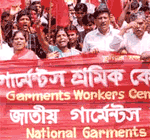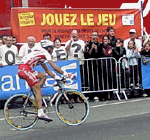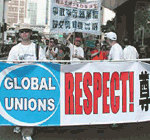Action in Bangalore
As part of the Olympics Campaign in India a National Workers
Exchange Programme was organized in Bangalore, India, from
27th to 29th of August 2004. This programme was to support
the Olympic Campaign's long-term objective of demanding
improvements during the Athens Olympics and consolidating
concrete gains for the workers by the time of Beijing Olympics
in 2008.
On the second day of the programme a small group of workers
and activists from Pondicherry, who work in a factory manufacturing
leather garments, visited a posh retail outlet of the factory
in Bangalore. 'Hidesign' is a well-known brand in leather
garments and accessories in India and abroad. The Hidesign
factory in Pondicherry, from where the worker-delegates
came, was infamous for its unfair labour practices and intolerance
of union activities. A strike was followed by repression,
victimisation of the workers' leaders and litigation.
Workers were amazed at the opulent beauty of the retail
showroom of Hidesign located in an up-market area of Bangalore.
Savundary, Selvi, Poongodhai, Shanthi, Suresh, Vaitheeswaran
and Geetha looked up and down at the expensive marble slabs
on the exterior of the spacious shop. The activists who
accompanied the workers had an argument with the security
guards at the doors of the building because the workers
did not look like the affluent customers who frequent the
place to buy leather goods! However, perhaps due to the
uncompromising look on the activists face or the fluent
English they spoke, the guards gave in.
The workers looked at the dazzling interiors of the store.
Leather jackets, bags of all varieties artistically designed,
belts and gloves were displayed as if they were works of
art by master craftsmen. They were works of art indeed,
but made by those very women workers who have been toiling
without even paid enough to fulfil their basic human needs.
Poongodhai looked at the price tag of one of the ladies'
bags and she seemed to be shocked! She exclaimed loudly
that it costs Rs.6,000. "It is my wages for three whole
months," she said.
Other workers huddled together and checked the price tags
of many of the things that they themselves manufactured
in the factory back home in Pondicherry almost 300kms away.
They giggled nervously in embarrassment looking at the almost
indecently high price of the products. 'Rich people must
be fools to pay such fantastic amounts for these articles,'
Savundary said. Businessmen are clever enough to manufacture
these things and sell them at exorbitant prices, paying
just a pittance in wages!
Shopping assistants in the store got curious and the workers
told them that they worked in the factories that manufactured
these things on show. They found to their merry surprise
that the shopping assistance and junior personnel were being
paid just a little more than what they themselves were earning.
When we all came out of the showroom, workers were both
thoughtful and angry. They were convinced that their employees
made enough profits to pay them better wages but did not
do so in their greed to keep most of the value that has
been generated by the effort of the workers. They felt that
only if workers at various levels struggled together, strengthened
their collectives and understood the working of the economy
of the industry, could they get a better deal. We are sure
that the small group of workers would tell the story of
their discovery to more than 1000 workers with whom they
work in the factory back home.




